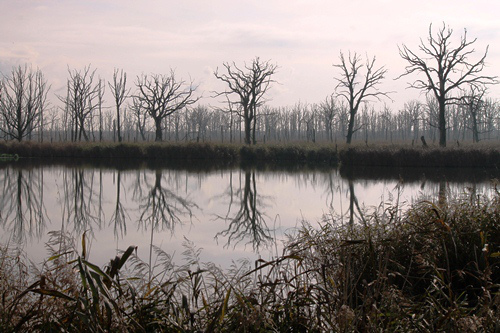Shadows and Reflections: the annual collection of postings where Caught by the River’s ever-reliable contributors and friends old and new take a look back on the events that have shaped the past twelve months. Today it’s the turn of Paul Scraton:
 Photograph: Anklam, northern Germany, by Katrin Schönig
Photograph: Anklam, northern Germany, by Katrin Schönig
When I look back on the past twelve months three things come to mind… walking, reading and writing. It was a year of great walks, from moorland rambles in Yorkshire – including a trek with thousands to find a good spot to watch the Tour de France – to continued explorations of the Berlin Wall Trail back home, which culminated in a book published to mark the 25th anniversary of the peaceful revolution in Germany.
Some walks were familiar, such as the headland of Rhoscolyn, North Wales, where I have walked, run and played since I was a small child, the Baltic coast which has the same meaning for my partner Katrin, and repeated wanderings along the Panke river that passes by my apartment building in preparation for another book which will come out next year. Other walks took me to places new, including the Harz Mountains and the Black Forest, the blind valleys of the Jura or the strange, melancholic beauty of the peat bogs near Anklam, in northern Germany.
In making these walks, and then writing about them, I have continued to be inspired by the books that I have been reading. Julian Hoffman’s The Small Heart of Things is a book I began in late 2013 and read into the new year. As with probably all of my selections, readers of Caught by the River will be familiar with Julian’s work, but in his explorations of place and belonging, focused on the Prespa lakes that straddle the border between Greece, Macedonia and Albania, I found something that has resonated through the months that followed:
“There is possibility in the smallest of things; the most innocuous of moments. More mystery can be found in a few moments spent in a stand of trembling reeds than a lifetime passed in an unperceived world”
Another book that continued to occupy my thoughts long after I had turned the final page is the
weird and wonderful Marshland by Gareth Rees, a book that mixes wanderings across the marshes of east London with history, folklore and the product of his imagination… a description that does not do justice to what you discover in those pages. Indeed, I haven’t written about Marshland before, perhaps because I am still digesting it as the images Gareth conjures appear unbidden in my waking thoughts and threaten to haunt my dreams.
Nick Hunt’s Walking the Woods and the Water, following in the footsteps of Patrick Leigh Fermor from the Hook of Holland to Istanbul was fascinating, not only in the exercise of comparison with a time separated from the present by over half a century of European history, but the new story that emerges. As a twenty-first century tale, what struck me most about Nick’s walk were the difficulties he encountered, not only the physical exertion of 2500 miles on foot, but the practical problems of attempting to walk it – the trunk roads and the overpasses, the lack of paths and pavements – that reflect a modern world increasingly hostile to the pedestrian.
The twenty-nine essays that make up Rebecca Solnit’s Encyclopedia of Trouble and Spaciousness explores topics such history, nature, disaster, politics, sexuality, justice, community and art that defies simple categorisation, with writing that lyrical in its beauty and provocative in the sadness, melancholy and eventually anger that is stimulated. Putting down the book after finishing another of the pieces, I began to realise that anger in this sense is a positive emotion… if enough people are provoked to anger, then perhaps something might change. This is the power not only of great ideas, but the great writing needed to communicate them.
And finally… to a book that I have been meaning to get to for years and which I finally read on a single, overcast Friday in early December. Austerlitz by W.G.Sebald. A book about place, about memory and imagination. About history, and reading the stories of our surroundings and those we find within ourselves. Finishing Austerlitz in the gloomy, late afternoon dusk of Berlin as it approaches winter I felt as if I had been struck to the gut.
So another year of walking and words. Of writers who inspire me not only to pick up a pen but, perhaps more importantly, to head out of the front door and explore everything big and small that is out there to be discovered. It has been a good year.
Paul’s blog – Under A Grey Sky
Paul on Caught by the River